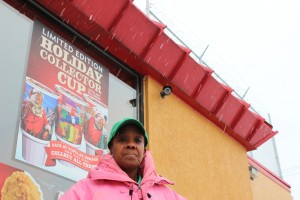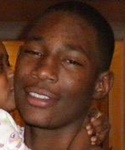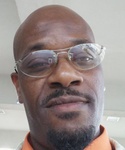
Marshall Fields-Hall / Family Photo
BY MICHAEL RANIERI
AustinTalks
Donna Hall picks up her phone and dials the number she’s had memorized for nearly a year. 312 … When the operator answers, she asks to be connected with the detective assigned to solve the homicide of her 21-year-old son, Marshall “Dantrell” Fields-Hall.
Like the hundreds of other phone calls she has made since that cold winter night, it’s met with disappointment. Not a single person has been brought in for questioning since the Jan. 18 shooting, Hall said.
Hall no longer lives anywhere near the North Austin area Popeyes restaurant where her son died in a hail of bullets. Hall believes it was gang retaliation, with as many as five people involved.
Since then, she’s worked tirelessly to bring justice to her son and the Austin community, but now from hundreds of miles south.
After 27 years in the Austin neighborhood, the noise she made over her son’s death landed her in Mississippi. Her push to find the men she believes are responsible for her son’s murder took a dangerous turn when a group of teens warned her that her home could be the target of Molotov cocktail attack. Hall believes they were sent by members of the same gang that killed her son.
Her surviving son, Terrell “T Magic” Hall, said he was also told to stay out of the way by an acquaintance who knows the gang members.
To Donna Hall, the message was clear: If she didn’t quit talking with police and asking neighbors for information then there would be trouble. So Hall relocated.
Vince Alonzo, the Chicago Police detective assigned to the Fields-Hall killing, said the threats against the family were unsubstantiated and Hall did not file a report.
But she did move, leaving behind the community where she attended school, raised her two sons and worked as a mail carrier for 21 years.
Terrell Hall, 28, Fields-Hall’s 1-year-old daughter, Serenity, and other family members followed her to Mississippi.
From her new home, Hall delivers mail on unfamiliar grounds and continues calling and emailing investigators and elected officials back in Chicago. She still posts her homemade flyers on Facebook and even raised money for a $10,000 reward — every penny from her own pocket.
Hall is open with her son’s past — he was found guilty of burglary in 2009 and received probation. When he violated his probation the next year, he got sent to boot camp for about three months. He was affiliated with a gang — one that had a rivalry with members from the gang she believes killed him, she said.
Hall wants to know why, despite the testimony of an eyewitness and two more people who know the alleged killers, the guilty aren’t behind bars — or at the very least, being brought in for questioning.
“They aren’t trying to solve this, because like I said, my son had run-ins with the police,” Hall said. “They knew him. I’m not disputing the fact that he was a gang member.”
Alonzo said prosecutors will only go to court if they have enough evidence or a credible witness, both of which he said are missing in this case. He notes the only eyewitness failed to identify the suspects in a photo lineup.
“We won’t make an arrest without probable cause,” he said.
Alonzo said he and the Chicago Police Department have been doing everything within their power to find the killers responsible for Fields-Hall’s murder, and if anyone comes forward with proof, they’ll move forward with charges.
CSI AUSTIN
Donna Hall and her sister, Patrice Williams, created their own press release to help spread the word about Fields-Hall’s killers: “TERRORISTS IN CHI-RAQ.” Underneath it, in big, bold, capital letters, Hall asks why police haven’t followed up with the leads she and her sister have found.
It’s been mailed, emailed and faxed to politicians, law enforcement, local organizations like the Rainbow Push Coalition and shared all around Facebook — including by the mother of Heaven Sutton, Ashake Banks.
Seven-year-old Heaven was caught in gang crossfire in June 2012 just blocks from where Hall’s son was shot as he sat in the fast-food chain where he worked. Mayor Rahm Emanuel voiced outrage at Heaven’s killing, and Police Supt. Garry McCarthy promised a quick arrest.
Fields-Hall and Heaven cousins, and reportedly killed by members of the same gang, Williams said.
Terrell Hall says the gangs began a series of retaliation strikes after Jovan “Shorty Black” Saffore, 17, was killed in November 2011.
“No one knows who killed that guy, but we know it was back and forth rivalry between [Fields-Hall’s gang and the killers’ gang]. They don’t care who killed who, they just wanted somebody.”
Terrell Hall runs a children’s entertainment business that he advertises with custom-made clothing, including hooded sweatshirts. Saffore received one of those hooded sweatshirts just before he died.
“Shorty stopped me one day and he said, ‘Hey man, what’s up with my hoodie? I’m part of the magic team.’ And I said ‘Yeah, you’re my homie.’ And I didn’t have another hoodie in the car, so I took mine off and gave it to him.’ A couple days after that, [Saffore] was murdered.”
Terrell Hall says he had no reason to suspect his younger brother in Saffore’s death, and Fields-Hall’s family makes it clear that regardless of his gang ties, he was loved.
Donna Hall counted hundreds of people at her son’s funeral, and on Oct.18 — the 10-month anniversary of his death — about 50 friends stood outside Popeyes and released balloons, Williams said.
In all, the sisters have identified eight people with gang ties who they believe have a connection to Fields-Hall’s death.
At the top of the family’s list of unanswered questions: Who is the man that appears on the fast-food restaurant’s only working surveillance camera?

Donna Hall stands outside the Popeys where her son was fatally shot
Williams and Terrell Hall described the scene they saw in the video: A man walks into the restaurant, but doesn’t buy food. Then the camera veers to the left, away from the spot where the shooter stood outside the entrance window. About two seconds later, everyone in the restaurant either ducks or runs from the gunfire, and Fields-Hall’s body is left bleeding on the floor.
Alonzo confirms Williams was shown the video in an effort to identify any suspects. She says her family has identified the man who turned the camera, but he has still not been brought in for questioning. Nor was the camera dusted for prints, she said.
Donna Hall suspects that since only one camera was moved, the killers had insider information — they must have been told which cameras worked and which did not.
Alonzo acknowledged the downed cameras as one reason for not bringing in any suspects for questioning. “Not all the cameras working was a factor,” he said.
This frustrates Donna Hall.
“I did the police work. I did all their work for them,” she said. “[The detectives] asked me for a lot of information. They asked me where they hang out at, what car they drive … I got all that.
“After I gave them the license plates, they never picked up [any] of the guys. So what was the purpose of me getting them?”
Alonzo describes this process as routine.
“We asked her if she hears anything to share it,” he said. “We asked her to keep her ears open and let us know anything she found out.”
FAMILY BONDING
Arbrett Stubblefield, 57, has a similar story. Her son Levi was killed in the South Austin area in November 2011.
Both Marshall Fields-Hall and Levi Stubblefield had criminal records, and their mothers took the investigations into their own hands, offering rewards for the arrest and conviction of the killers.
Arbrett Stubblefield, like Hall, has spent a lot of time trying to solve the case on her own after it seemed investigators had lost interest. When her son went missing, she sought witnesses and eventually found her son’s body, alone in an empty apartment building three days after his disappearance.
“God guided me,” she said. “Nobody knew where he was.”
Police made an arrest in Levi Stubblefield’s death more than a year later. She’s grateful someone’s being held responsible but is still upset over what it took to get to this point.
“The police told me the same thing. ‘Your son has a record.’ So what are you trying to tell me, he has a record so he deserved to die?”
Stubblefield said her complaints to police were met with attitude — leaving both mothers with the impression their sons’ deaths didn’t matter because of their criminal histories.
After Fields-Hall’s was shot, his family said police never asked about his gang ties, but they had discussed his gang ties in an unrelated incident, Donna Hall said.
Before his death, her son was pulled over by a police car in front of her house. When she went out to talk to the officers, they informed her of his alleged history and pointed out his tattoos.
And like Fields-Hall’s case, Levi Stubblefield’s killing did not go unnoticed.
“There were witnesses,” Arbrett Stubblefield said. “But the police said, ‘They didn’t actually see [the killer] pull the trigger,’ and I said, ‘Seriously? Who admits to killing someone?’ People don’t really admit to killing anyone.”
Witnesses in both cases came forward at the mothers’ prodding.
Police had warned Stubblefield that vigilante-style investigation would come with risks — that it could put her in harm’s way.
“They said be careful, [the killer would] retaliate. I said, ‘I’m not afraid of anybody.’”
At one point, Donna Hall believed an arrest was about to be made in her son’s case. A 911 dispatcher called her in May to tell her, “They just got the boys up on North Avenue.” Hall said she sped to meet the officer at the scene where she was asked, “Which one is it?”
She pointed to a boy dressed in white, at which point he was handcuffed and the other three men were let go. But within minutes, Hall said, the boy in back of the squad car was let go, too.
“The cop went in his car … got on the phone saying something; he comes back telling me he’s got to let him go.”
“What do you mean you got to let him go?” Hall asked.
“Well, I can only take him if he’s gonna go voluntarily,” the officer replied.
“The boy laughed at my face after the police let him go,” Hall said.
Donna Hall believes her son’s killer and accomplices remain at large — and on the streets of Chicago.
“I feel like the only thing that will help me sleep is if [the killers] are locked up,” she said. “Marshall doesn’t mean anything to the police, but he was everything to me.”
She says police have stopped returning her calls; she believes her son’s criminal record is the reason no one has been brought in for questioning.
Still, she’s determined to solve the case.
“I’m not going to rest until this person’s behind bars … I’m not gonna stop until I piss a lot of people off, until they solve this murder… . Four times they shot him. He died on the floor. They didn’t find guns, drugs, nothing … You’re not just going to put this on the cold case files.”
This story is part of a week-long series about homicides on the West Side being published by AustinTalks. The local news web site – operated by Columbia College Chicago’s Journalism Department – undertook the three-month project with support from The Chicago Community Trust. If you have questions or comments, please e-mail austintalks.org@gmail.com.






